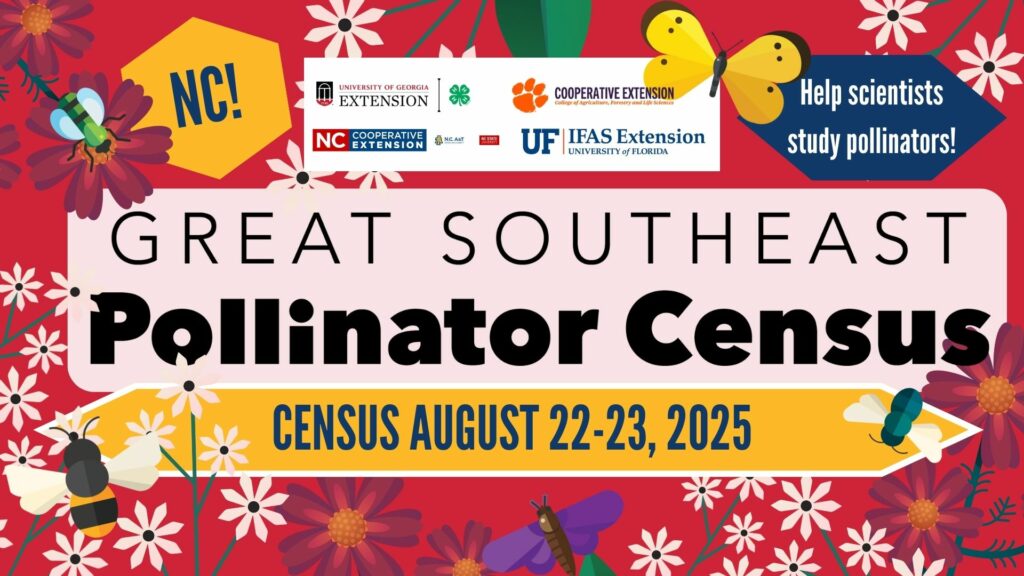Counting for a Cause: Volunteers Power Pollinator Conservation
go.ncsu.edu/readext?1068557
en Español / em Português
El inglés es el idioma de control de esta página. En la medida en que haya algún conflicto entre la traducción al inglés y la traducción, el inglés prevalece.
Al hacer clic en el enlace de traducción se activa un servicio de traducción gratuito para convertir la página al español. Al igual que con cualquier traducción por Internet, la conversión no es sensible al contexto y puede que no traduzca el texto en su significado original. NC State Extension no garantiza la exactitud del texto traducido. Por favor, tenga en cuenta que algunas aplicaciones y/o servicios pueden no funcionar como se espera cuando se traducen.
Português
Inglês é o idioma de controle desta página. Na medida que haja algum conflito entre o texto original em Inglês e a tradução, o Inglês prevalece.
Ao clicar no link de tradução, um serviço gratuito de tradução será ativado para converter a página para o Português. Como em qualquer tradução pela internet, a conversão não é sensivel ao contexto e pode não ocorrer a tradução para o significado orginal. O serviço de Extensão da Carolina do Norte (NC State Extension) não garante a exatidão do texto traduzido. Por favor, observe que algumas funções ou serviços podem não funcionar como esperado após a tradução.
English
English is the controlling language of this page. To the extent there is any conflict between the English text and the translation, English controls.
Clicking on the translation link activates a free translation service to convert the page to Spanish. As with any Internet translation, the conversion is not context-sensitive and may not translate the text to its original meaning. NC State Extension does not guarantee the accuracy of the translated text. Please note that some applications and/or services may not function as expected when translated.
Collapse ▲
NC State Extension Master Gardener℠ volunteers are doing more than growing gardens—they’re protecting ecosystems and food supplies by teaching North Carolinians how to support pollinators. From classes and workshops to educational gardens and community outreach, pollinator conservation is an integral part of Extension Master Gardener volunteer service. Master Gardener volunteers now have a powerful new way to amplify that impact: by taking part in the Great Southeast Pollinator Census (GSEPC).
The GSEPC is a two-day, citizen science project that invites people of all ages to step outside and observe pollinators in action. Participants count insects visiting flowering plants in gardens, parks, and green spaces—contributing valuable data on pollinator populations and diversity across the Southeast. But the census isn’t just about counting—it’s about inspiring action, sparking curiosity, and helping people see their role in pollinator protection.
Originally launched in 2017 by University of Georgia Extension specialist Becky Griffin, the GSEPC has expanded throughout the southeastern US, reaching North Carolina in 2023, thanks to a dedicated team of Extension specialists from NC State and N.C. A&T State University. In 2024, North Carolinians showed up in a big way—and Master Gardener volunteers helped lead the charge.
North Carolina’s 2024 Census by the Numbers:
- 212 Master Gardener volunteers dedicated over 310 hours to data collection
- Master Gardener volunteers hosted census events in 19 counties, engaging adults and youth at Extension centers, demonstration gardens, and farmers markets
- 2,283 individuals contributed data in NC—a 55% increase over 2023
- 78 counties across NC were represented
- 88% of participants reported increased knowledge of pollinator conservation
- 72% reported making changes to their gardening practices to better support pollinators
More Than Data: Growing Awareness and Action
In addition to counting pollinators like bees, butterflies, moths, flies, and wasps, Master Gardener volunteers used the census to connect with their communities and spark lasting change. By showing others how to create pollinator-friendly gardens and manage their landscapes sustainably, they helped North Carolinians make choices that benefit both pollinators and people.
Amanda Bratcher, Extension horticulture agent in Lee County and North Carolina’s census coordinator, shared, “I was so proud of the Extension Master Gardener volunteers across North Carolina owning the program and using it as a way to engage with their local communities about pollinator conservation in unique ways.”

Join the Buzz in 2025
The Great Southeast Pollinator Census is more than an event—it’s a movement that empowers individuals to be part of the solution. North Carolina’s participation is critical to understanding pollinator trends in our region and building stronger conservation strategies. Here’s how you can get involved:
- Save the date for the 2025 Census: Friday, August 22 and Saturday, August 23
- Contact your local N.C. Cooperative Extension Center to see if events are planned near you
- Learn more and explore resources for participating in the GSEPC in NC
Curious about the data?
Explore the results of the 2024 Great Southeast Pollinator Census and learn how your observations can help pollinators thrive.

Join, support, or connect with Extension Master Gardener volunteers in your community.


